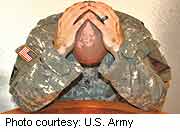- Could Your Grocery Store Meat Be Causing Recurring UTIs?
- Are You Making This Expensive Thermostat Error This Winter?
- Recognizing the Signs of Hypothyroidism
- 10 Strategies to Overcome Insomnia
- Could Artificial Sweeteners Be Aging the Brain Faster?
- Techniques for Soothing Your Nervous System
- Does the Water in Your House Smell Funny? Here’s Why
- Can a Daily Dose of Apple Cider Vinegar Actually Aid Weight Loss?
- 6 Health Beverages That Can Actually Spike Your Blood Sugar
- Treatment Options for Social Anxiety Disorder
Talk Therapy May Cut Suicide Rate Among U.S. Soldiers: Study


Short-term cognitive behavioral therapy can lead to fewer suicide attempts among at-risk U.S. soldiers, a new study suggests.
Cognitive behavioral therapy is a type of talk therapy designed to stop ineffective and damaging patterns of thinking.
Mental illness diagnoses among active-duty U.S. military personnel rose by more than 60 percent during the wars in Iraq and Afghanistan, with a similar increase in rates of suicide and suicide attempts, the researchers wrote.
“The significant increase in military suicides over the past decade is a national tragedy,” said study co-author Alan Peterson in a University of Texas Health Science Center at San Antonio news release. He is a professor of psychiatry at the university’s School of Medicine.
The study included 152 active-duty soldiers who had attempted suicide or were considered to be at high risk for suicide. Over two years of follow-up, soldiers who received the therapy were 60 percent less likely to attempt suicide than those who received standard treatment.
“To see a 60 percent reduction in suicide attempts among at-risk active-duty soldiers after a brief intervention is truly exciting,” Peterson said.
Study co-leader Craig Bryan, a clinical psychologist at the University of Utah and executive director of the National Center for Veterans Studies, explained how the treatment works.
“The treatment is focused on how to manage stress more effectively, how to think in more helpful ways and how to remember what is meaningful in life. In essence, the soldier learns how to live a life worth living in a very short period of time,” Bryan said in the news release.
The study was published online recently in the American Journal of Psychiatry.
More information
The U.S. National Library of Medicine has more about suicide.
Source: HealthDay
Copyright © 2026 HealthDay. All rights reserved.










